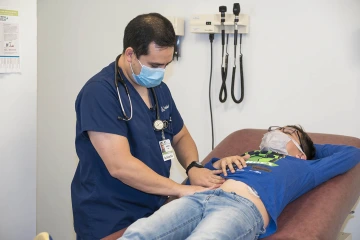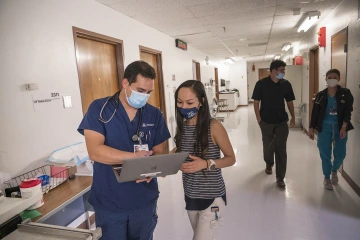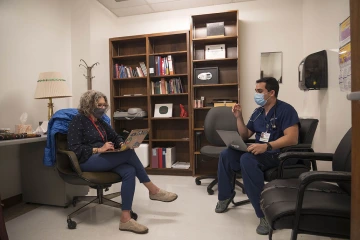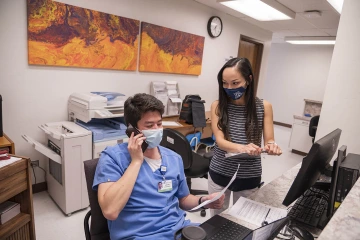Medical Students Learn Vital Skills Through Community Service
The Shubitz Family Clinic provides cultural engagement opportunities for College of Medicine – Tucson students who deliver free health care services.
The issue of health equity has had a profound impact on how the University of Arizona Health Sciences prepares its students to better meet the care needs of all patients. At the UArizona College of Medicine – Tucson, improving health care disparities includes training the next generation of physicians to understand the cultures and speak the languages of patients in underserved communities.

Andres Diaz (left) gets hands-on training while providing free primary health care services to underserved people in Tucson and the surrounding areas through the Shubitz Family Clinic.
The Shubitz Family Clinic is one of eight in-house clinics that are part of the College of Medicine – Tucson’s Commitment to Underserved People (CUP) program.
The clinic provides free primary health care services to uninsured patients in Tucson and is run by College of Medicine – Tucson medical students who provide care under the supervision of the medical director and volunteer physicians.
“You have to have a sense of service to be a physician,” said Patricia Lebensohn, MD, medical director of the CUP clinics. “That sense of service is really what happens in the Shubitz Family Clinic. The medical students get to experience and understand the responsibility it takes to provide services to underserved populations.”
Training to fill a community need
Few students appreciate the opportunity to work at the Shubitz Family Clinic more than Lily Nguyen, RN, the clinic’s lead coordinator. Nguyen, a second-year College of Medicine – Tucson student, grew up in a small but close-knit Vietnamese refugee population in Tucson. Her father, David Nguyen, suffered from chronic hypertension and was diagnosed with renal failure in his early 40s.

Diaz discusses a case with Lily Nguyen, RN, a second-year medical student who served as the clinic’s lead coordinator during the fall semester. Nguyen says the Shubitz Family Clinic provided practical experience that could one day help her open her own practice.
“I always wonder if that could have been prevented,” Nguyen said. “My parents are non-English speakers and our family had difficulty navigating the health care system.”
When Nguyen enrolled at the College of Medicine – Tucson and learned about the CUP program, she was instantly drawn to the Shubitz Family Clinic, which is open from 6 to 9 p.m. every Tuesday.
“I was surprised that I hadn't heard about it before,” Nguyen said. “Because our family could have definitely utilized it.”
The Shubitz Family Clinic offers students like Nguyen a space to gain practical medical experience helping patients who don’t enter the health care system in a traditional way. Approximately 40 students each month rotate through the clinic, which provides a hands-on component to their medical school curriculum.
“We use this analogy that medical school is a fire hydrant of information,” Nguyen said. “Shubitz is the place where I can take my education and knowledge and put it into the real world and see how it affects patients who come from a variety of backgrounds and cultural influences.”
Caring for those without health care
During Shubitz Family Clinic hours, Nguyen leads a team of approximately one dozen students who run the operation and provide medical services. They can accommodate up to 12 patients per night. Dr. Lebensohn or another “attending” physician are always on site, overseeing and supporting the medical students as needed.

Dr. Patricia Lebensohn (left), medical director of the CUP clinics, reviews a case with Diaz, one of the medical students providing care to Shubitz Family Clinic patients.
“These are patients from a lot of different cultures who, for the most, don't get any health care,” Dr. Lebensohn said. “We have many patients with chronic medical conditions – diabetes, hypertension, hyperlipidemia and other similar conditions.”
When patients arrive, they are met by a triage team composed of two first- or second-year medical students. They are tasked with screening the patients for COVID-19 symptoms outside the clinic before bringing them inside. The patient’s blood pressure and vital signs are then taken inside, before the triage team hands the case over to a care team. On-site or telehealth interpreters are always available for Spanish-speaking patients.
Each care team comprises one third- or fourth-year medical student and one first- or second-year student. Together, they learn the patient’s medical history and identify the reason for their visit to the clinic. The care team then discusses the information with the attending physician, and together they develop a plan of care and discuss it with the patient.

Joseph Gunderson (left) is one of the many medical students to get hands-on experience in a variety of roles at the Shubitz Family Clinic, which includes a care connections team where students function as medical social workers or case workers connecting patients with the resources they need.
If a patient needs laboratory work such as a blood panel, an on-site lab coordinator and a medical student schedule the procedures, which are completed in-house. The clinic also can provide services for ultrasounds, electrocardiograms, immunizations and screenings for sexually transmitted infections.
Once the care team completes a patient’s examination and treatment, a care connection team takes over. These students help patients schedule follow-up appointments and handle prescriptions, as needed. They also provide information for accessing medical care through the Arizona Health Care Cost Containment System and other programs.
“I've learned so much from this experience that I didn't think I would learn in medical school,” Nguyen said. “It has made me a better leader, and I understand all the different roles that it takes to run a clinic. That will help me in my career if I ever want to open my own practice.”
Extras
The Shubitz Family Clinic is located at the CUP Clinics in the College of Medicine – Tucson. Use the south entrance and continue straight down the hallway to room 2304. Free parking is available after 5 p.m. in the Health Sciences Garage on Campbell Ave. To schedule an appointment, call 520-393-9336.
Our Experts
Contact
Blair Willis
520-626-2101
bmw23@arizona.edu

